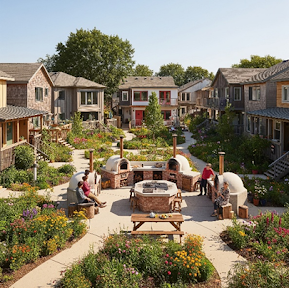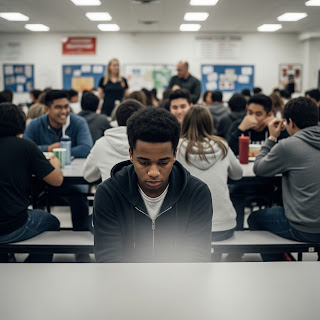W1: "The World I Want to Live In"
W1: "The World I Want to Live In"
🌍 The World Beyond Walls
A Different Kind of Tomorrow
Close your eyes for a moment. Picture a neighborhood with no gates, no guards, and no fear. Laughter of children from different backgrounds echoes under the canopy of trees that seem to whisper stories in every language. In this imagined world, compassion is currency and inclusion is law.
This is not a utopia built on fantasy, but a vision rooted in values we urgently need today—equality, justice, and shared humanity. I call it The World Beyond Walls, and it represents the kind of future I believe we can and must build together.
What Would It Look, Sound, and Feel Like?
Figure 1: Schools Float
on Lakes in Flood-prone Areas
In this
world, cities are designed around people, not profit. Buildings are made from
biodegradable materials like hempcrete and living mycelium that change with
community needs. Schools float on lakes in flood-prone areas to ensure no child
is left behind because of climate or location.
Figure 2: Streets Hum
with Music from Different Cultures
The streets
hum with music from different cultures, blending into a living symphony of
peace. There are no sirens, only the sound of storytelling, soft wind chimes,
and joy. People greet each other with open palms. Here is a universal gesture
of peace.
Public spaces are multi-sensory. Vertical gardens grow on rooftops, releasing the scent of jasmine. Community ovens bake fresh bread, shared freely. Technology enhances emotional well-being: benches play music to reduce anxiety, and light therapy zones brighten lives during cloudy days.
Figure 3: Homes
are Shared Not Owned
Homes are shared, not owned. There is no homelessness, and no mansion stands empty. Education is lifelong and free. It is a blend of science, storytelling, and sustainability. Healthcare is preventive and holistic, combining both modern medicine and indigenous wisdom. Every elder is a teacher. Every child is valued.
Values and Laws That Shape This World
This
This world is shaped by restorative justice and the African philosophy of
Ubuntu — “I am because we are.” (Paulson, 2020) Laws focus not on punishment,
but on healing and transformation. Disputes are resolved in community circles,
not courtrooms.
Technology
supports justice. Artificial intelligence ensures fair trials and equitable
resource distribution but never replaces human connection. AI helps amplify
marginalized voices in governance—not suppress them.
Core
laws include:
- The
Right to Empathy – Emotional literacy is taught from early childhood.
- The
Kindness Dividend – Compassion is rewarded in workplaces.
- The Zero Waste Mandate – All production is circular; nothing is wasted, and everything is reused.
Personal Reflection: Why It Matters
This world is personal to me.
Figure 4: Under The
Weight of Bullying
As a
student, I watched a dear friend fade under the weight of bullying. He was
soft-spoken, came from a minority background, and didn’t fit into society’s
mold. Teachers turned away. Classmates mocked. Eventually, he stopped coming to
school.
His story, like countless others, shows how our current systems fail those who don’t conform.
I
dream of a world where no child is made to feel small and where schools
celebrate differences, not punish them. Where justice is rooted in empathy and
education uplifts the heart, not just the mind.
This
is why The World Beyond Walls matters. It's not a fantasy. It's a blueprint for
SDG-driven change.
Barriers: What’s Stopping Us?
It’s
not technology or money that stops this world—it’s apathy. Fear dominates our
policies: fear of change, fear of loss, and fear of others. We invest more in
prisons than peace. We measure success by GDP, not by compassion.
We’re
told this vision is “too idealistic.” But that’s what the status quo says to
people who dare to imagine better. As Greta Thunberg once said, “No one is too
small to make a difference.” Change begins with those who refuse to settle.
Conclusion: The Heart of the Future
The World
Beyond Walls is not just a dream—it is a call to action. Every time we
speak up against injustice, include the excluded, or choose kindness over
cruelty, we lay another brick in this world.
We
won’t build it with concrete.
We
will construct it with our hearts.
References
Paulson,
S. (2020, September 30). “I Am Because We Are”: The African Philosophy
of Ubuntu. To the Best of Our Knowledge.
https://www.ttbook.org/interview/i-am-because-we-are-african-philosophy-ubuntu






Comments
Post a Comment